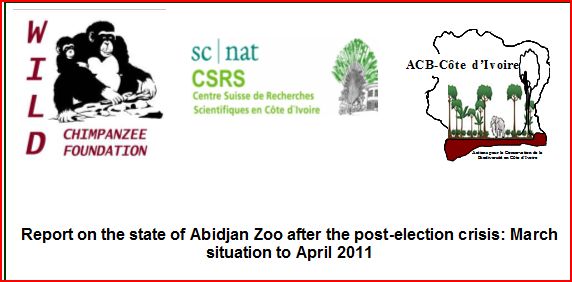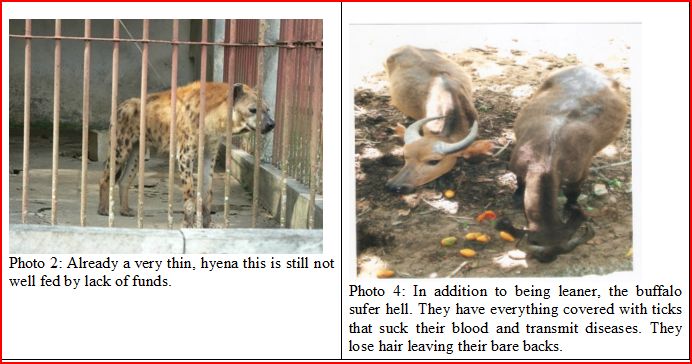Address:
bdagui@yahoo.fr/ sban@csrs.ci
To send a donation to help please click on the donate button on the following page:
http://associationducalaoasbl.solidairesdumonde.org/
Thank You. Any amount will help
***********************************************************************
Peter's Note : This report was originally in French and has been quickly translated into English so there are mistakes. I was traveling today and so did not get the report till late but saw the immediate critical importance to get it out as soon as possible. IT IS URGENT THAT SOME SORT OF ACTION IS TO TAKE PLACE IMMEDIATELY. TOMORROW MAY BE TOO LATE.
Read the letter below. Make contact at the email addresses above
send you the report I submitted to the new minister who takes care of the zoo since March 2011, fighting had intensified in Abidjan and the animals had nothing to eat the result was catastrophic. the zoo director had left his post since February, so I made money from Fanta to pay for food for all animals, but on March 26 we were all holed up in our homes because of fighting, remained animas almost three weeks without eating really, four officers remained at the zoo to give them as herbs during this time so the animals do not have fans and that to cause their death, when things calmed down I went to the zoo pay for food with the rest of the money from Fanta and I launched a relief operation, good wishes have given money that was used to feed animals, I contacted the press to alert authorities through our TV channel, BBC radio and AITV. I met the minister and he promised to help us, we need money to continue ...
I will send one part of thios paper foer Hilda.
Thanks.
BAN Dagui Simone
Doctorant en Ecologie tropicale /Option:Animale
Université de Cocody / UFR-Biosciences
Centre Suisse de Recherches Scientifiques en Côte d'Ivoire
00225 05 44 04 37
***********************************************************************
Introduction :
Faced with the continuing degradation of forest fragments Ivorian and the widespread loss of biodiversity that they encompass, Côte d'Ivoire has chosen the ex-situ conservation as an alternative approach to the conservation and sustainable management biodiversity of animal populations. The Zoo of Abidjan has been created since 1972. Indeed, besides its recreational function, the Zoological Park is an ideal place to know, love and respect animals, to educate the public about environmental issues. It thus provides a path to the sustainable conservation of wildlife by providing a forum for education, conservation and breeding of animal populations. The zoo can consider such reintroductions of species extinction or critical voices have disappeared in the wild. The Zoo of Abidjan, representing the only zoo in Côte d'Ivoire must therefore play an important role in the overall strategy for conservation of animal species in this country.
To ensure effective management of this heritage zoo, the state made efforts by assigning officers and a director. The daily receipts related visits (entries) help sustain the resources released by the state for animal feed, veterinary costs and maintenance of the zoo.
Unfortunately, the revenue generated by daily visits and state funds have often proved inadequate because our country is facing for over a decade to a socio-political crisis (Sangare, 2008).
Indeed, the park has deteriorated over the years due to lack of environmental enrichment, lack of medical care for animals, bad food and poor living conditions in which animals live. These poor living conditions often lead to the death of the animals whose numbers have declined sharply in recent years (Gonedelé Bi et al., 2007).
For it seems to avoid the worst, grants are sometimes made by private persons and also NGOs to support or provide additional resources for managers in the zoo. Since 2006, the NGO Wild Chimpanzee Foundation (WCF) or Wild Chimpanzee Foundation provides special assistance for Primate Zoo of Abidjan. Another NGO called ABC-CI (Action for Biodiversity Conservation in Côte d'Ivoire) is seeking funds to rehabilitate the zoo and develop environmental education at all levels of Ivorian society.
The Ivorian socio-political crises including the most recent and most critical is that of post-election crisis (December 2010-April 2011) helped to entrench the Abidjan Zoo in this state of degradation.
We, participants of the NGOs mentioned above, have taken the initiative to pay special attention to those animals trapped in cages. With our experience and in view of the seriousness of the recent post-election crisis that has diverted the attention of the authorities to other priorities, we felt it necessary to bring to the attention of the Ivorian state's only zoo of their country so that concrete actions are undertaken. In this report on the state of Abidjan Zoo during the post-election crisis, we present the list of dead animals, the condition of survivors, state visits since our awareness during this period.
A-Post-election crisis and state of the animals at the zoo
Because of its location at the entrance of Abobo, the town was the scene of deadly clashes in the first post-election crisis, the Abidjan Zoo early on felt the direct effects of the crisis. Since December 2010, the agents most of whom live in Abobo could no longer travel regularly to the zoo. Visits to the zoo were scarce and therefore the animals received little attention. Aware of this animal at the zoo in Abidjan, we have maintained our actions to support the zoo in bringing food including fruits for all frugivorous animals.
From March 2011, with the intensity of deadly clashes in the city of Abidjan, the situation has worsened to the zoo. The list of groups of animals at the zoo with the numbers of individuals of each of these animals is presented in Table 1. The numbers of animals per species at the zoo in Abidjan are not high and they are generally less than 10 individuals, except in mangabeys and chimpanzees, which slightly exceed this figure and especially the crocodiles that are 54 individuals. Although the numbers of each species are few, the animals were divided into 25 different species. There are 8 species of animals (civet cat, peacock, squirrel, pygmy hippo, vulture, elephant, green and patas monkeys) that are now represented at the zoo by a single individual. Inadequate food that we make and especially the lack of animal protein for some animals such as carnivores caused pronounced weight loss in most of them in March (photo 1, 2, 4).
In April the situation in Abidjan Zoo became even worse and we went there April 12, 2011 to support the animals as we had always done. On our arrival, we met a few agents makes us the inventory we found the weight loss yet the only lioness depth remaining (photo5) and death of some animals still in cages (photos 6, 7) as agents in place could not get into the cage in question due to lack of technical means. Indeed, to enter the cages must obviously break the lock (the key with some agents having remained absent) and after replacement.
Ultimately, in March, the zoo had 151 animals and 112 in April. What constitutes a loss of 39 animals representing a loss of 25.85% of the total with the disappearance of four species namely lions, baboons, monkeys and antelopes Campbell. three-week crisis. Note the total disappearance of some important species such as lions, baboons, antelopes and monkeys Campbell. Some animals like pythons, alligators and crocodiles have suffered no loss. Under analysis in Table 1 and Figure 1 indicates that frugivorous and carnivorous animals in the zoo have suffered the adverse effects of this crisis then herbivores and the group of reptiles have coped. Chimpanzees, monkeys, baboons and patas are the main frugivorous zoo, as lions, hyenas, civets to the kites and vultures are the group of carnivores at the zoo. These two groups have daily needs of food and therefore food shortage for a long time, it can be fatal, the group of scavengers that are the crocodiles and alligators as they only eat dead chicken. This group and reptiles such as pythons have not had any problems because they have a slow regulation and may remain for several days without eating.
With regard to our actions in the light of this, initially, have been to give money to the officers to remove all dead animals cages. Of the two dead chimpanzees, the male was the only male in the zoo know copulate and had managed to pregnant females (Arm-length on the picture 12 with her baby) and a baby is born now aged three. Chimpanzees, copulation is a social act that is learned with others and
like all the chimpanzees at the zoo were definitely torn wilderness to their very young mother can not remember many things. We found more emaciated the animals, more sad and sick from lack of food (photos 9, 10, 10, 12) and agents as desperate and very concerned about their fate. We immediately searched for food for the animals still alive. This was possible thanks to the officers who accompanied us in the races since it was difficult or almost impossible to move alone in the streets of Abidjan at this time. With soaring prices on the market during the crisis, our money ran out quickly, so we appealed to everyone through the radio (radioTCI) and good wishes and some of our partners. One of our partners and a willingness to have responded favorably, which helped us save the lives of the zoo animal remains to this day.
In order to prevent, other problems we have seen fit to inform the competent authorities as the entire administration of the zoo is absent until the time of writing this report (May 7, 2011). According to officials, the Director will be absent for months. The zoo was thus left to his own yet he had to survive under these key educational, recreational and its role in conservation. We took the risk to act on animals in cages, deprived of all freedom and all. Indeed, some resident agents around the zoo have assured the permanence at the height of the crisis. They braved all dangers by ensuring their duties of feeding the animals. In the words of one who takes care of the elephant, each day he risked his life to cutting grass to feed it, he said that an elephant must always have his daily ration even if it is insufficient if this large mammal falls and not rise again. And knowing this, he was faithful to his task well within the scope of bullets. Early four officers have ensured a minimum service, with no resources, they cut the grass around the zoo to feed animals they could eat. Thus, some animals such as hyenas, civets, sea turtles have adapted to this crisis (food for these animals) and become more frugivorous (photo 13, 14). This is a change of diet. Indeed, these animals eat meat, respectively fish and consumers have become more fruit. In the space of three weeks (from March 26 to April 12, 2011), the zoo has undergone huge losses, then follow the balance sheet.
B-state current daily receipts:
Figure 4: Table showing the total revenue obtained from daily
April 16, 2011 to May 8, 2011
C- The current status of staff at the zoo:
In the words of the agents, they have not received their salary for four months. And yet they remained faithful to their post during this crisis in the care of animals. The agents to date are
13 in number. These are: They are: Blue Marcellin Oulaï Boniface Sie Kam, Kouakou Felix Akissi Augustine, Jerome Bla, Oulaï Alexis, André ZOH, Topka Firmin, Kouame Kouadio, Sela Rodrigue, Bert.
D- State vehicle zoo:
In February 2011, the Director had informed us that he was no longer in possession of the vehicle at the zoo after the massive displacement of Abobo. Since that time we have used metered taxis to transport food animals. Thursday, April 6, reporting the vehicle was parked it would agents in the town of Abobo and officers went noticed. The costs for this are around 40 000Cfa and seen all the current expenses, we are obliged to ask for help.
E- Partners helping the zoo:
This special action that we carry for a month is the work of certain Ivorian and European goodwill, NGOs and private companies. We thank them. Special thanks to Mrs. Kante Aïha its support of this action and collaboration and net franchise and Mr. Michael Kribi Afreek group for its expertise in web communication.
F- Urgent at Zoo:
A vehicle for liaison between the different sites of food supplies;
The presence of a veterinarian for the health of animals to avoid possible dead;
The need for food for all animals. Indeed, frugivores need for example an average of five cases per day plus a banana boxes of mangoes, a total of 40 000 to 5000Fcfa if we want to feed the animals. As for primates, they need 20 to 30 kg of meat per day. And fish from about 15 to 20kg per day.
You have to pay agents to enable them to resume work properly.
Conclusion:
This difficult situation through the zoo shows both the image of the Ivorian society is facing many problems and also the mismanagement of our leaders. Today the zoo is back in politics and we see the results are paying the consequences. The zoo is Life, Joy, Nature. The zoo should make us dream, share the love. Not the zoo is not a place of bitterness and even a cemetery. ZOO Let the real men, those who love him and who know the importance. We want more men interested in their own people and full of shameless self-interest. The State play its part and ask to account those who have taken the responsibility to manage. Love the zoo is to love life...
Recommendations:
Designing brochures, flyers and posters to give key information to target populations and also inform them about the activities we organize.
Hold open days at Abidjan Zoo;
Organizing drawing competitions, debates, or poems to help target populations to better understand animals and their roles in nature;
Writing articles or letters to newspapers or newsletters;
Publish local extension works to accompany the actions of environmental education (eg information booklet on rare vertebrates and dangers on endangered plants ...);
Ensure regular medical visits to the animals through a contract with a veterinary practice, organizing a vaccination program for officers;
Organize meetings of Environmental Education (Contact with schools, building restoration (already identified need roofing and painting) into a screening room and education);
Conduct training sessions or retraining of supervisors for better tracking of animals;
Research funding and international organizations to integrate the Zoo to international funding programs (like the NGO ACB-CI;
Sales of gadgets bearing the likeness of various animals present;
Promote scientific research at the zoo in zoology, veterinary science, social science ...;
Ensure regular pay agents;
Creation of fields in the space not usable at the zoo to supplement the diet of animals.
Table 1: List of live and dead animals at the zoo with their staff in a
months (from March 26 to April 12, 2011) Crisis
Figure 1: Diagram showing the reduction of animals in three weeks function of diet
***
Please Visit
The Zoo Professionals Book Store
if you are looking for a book. This is an Amazon affiliate and you will get a good deal
also
you can subscribe to the largest and longest established zoo related ezine
by clicking
HERE
To advertise in Zoo News Digest please see HERE
Money for Free
If you can write, you can earn. Write about what you like or what you know about. Build up a passive income which will earn you money daily. No catch, no charge. Click on the link below and you could start earning today















No comments:
Post a Comment